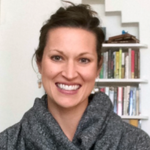The Center offered an essay contest for graduate students in 2018 and 2019. These essays use philosophical insight and argument to address an important issue in educational policy and/or practice.
2019 Essay Contest Winners
Shannon Brick, co-1st place
 Bio: Shannon is a PhD candidate in Philosophy at the CUNY Graduate Center in New York City. She works in moral and social epistemology as well as ethics more broadly. She also has strong secondary research interests in aesthetics and feminist philosophy – particularly feminist theories of relational autonomy. She is currently working on her dissertation, which develops an account of authenticity of persons. Shannon originally hails from Australia, where she completed her Undergraduate Degree and M.A. from Monash and Melbourne University respectively.
Bio: Shannon is a PhD candidate in Philosophy at the CUNY Graduate Center in New York City. She works in moral and social epistemology as well as ethics more broadly. She also has strong secondary research interests in aesthetics and feminist philosophy – particularly feminist theories of relational autonomy. She is currently working on her dissertation, which develops an account of authenticity of persons. Shannon originally hails from Australia, where she completed her Undergraduate Degree and M.A. from Monash and Melbourne University respectively.
Paper Title: Moral-Epistemic Duties Amid Political Contestation
Abstract: School teachers are charged with giving students many of the conceptual tools they will
need in order to be autonomous participants in the ethical community. Although there is some consensus as to what these tools are, there are many areas of the conceptual landscape where no such consensus exists. With respect to contested concepts, what are educators supposed to do? I argue that in some circumstances, teachers have a responsibility to teach content that is politically contested. This is because, despite their having a default responsibility to be responsive to the existence (or lack thereof) of public consensus and so not teach content that is politically contested, in non-ideal conditions like those that currently exist, teachers have a weightier responsibility to give students contested concepts when doing so is necessary for promoting hermeneutic justice. I argue that the social sciences provide an optimum setting in which educators can discharge this responsibility, without risking public or parental backlash and the moral and epistemic costs that are liable to follow hot on its heels. Rather than simply charge students with engaging with the extant state of public debate, however, teachers must first ensure a hermeneutically just playing field. This requires exposing students to the marginalized experiences that are relevant to specific contemporary discourses.
A full version of the paper is available on request; please contact sbrick@gradcenter.cuny.edu
Kathryn Joyce, co-1st place
 Bio: Kathryn Joyce is a Ph.D. candidate in the philosophy department at UC San Diego. Her research focuses on social and political philosophy and the philosophy of education. She is especially interested in questions that lie at the intersection of social/political philosophy, moral psychology, and social epistemology. Kathryn is currently writing a dissertation on relational egalitarianism that analyzes its core concepts and develops an account of the nature and value of egalitarian relationships among members of society. She plans to extend this project by exploring what her account implies for education and educational justice. Her other recent work concerns normative and methodological issues related to evidence-based education policy and practice (links to published articles can be found here).Kathryn serves on the organizing committee for UC San Diego’s Summer Program for Women in Philosophy.
Bio: Kathryn Joyce is a Ph.D. candidate in the philosophy department at UC San Diego. Her research focuses on social and political philosophy and the philosophy of education. She is especially interested in questions that lie at the intersection of social/political philosophy, moral psychology, and social epistemology. Kathryn is currently writing a dissertation on relational egalitarianism that analyzes its core concepts and develops an account of the nature and value of egalitarian relationships among members of society. She plans to extend this project by exploring what her account implies for education and educational justice. Her other recent work concerns normative and methodological issues related to evidence-based education policy and practice (links to published articles can be found here).Kathryn serves on the organizing committee for UC San Diego’s Summer Program for Women in Philosophy.
Paper Title: Prioritizing Disadvantaged Students in Principle and in Practice
Abstract: U.S. education policy uses an evidence-based education model (US-EBE) to pursue two goals: (1) raise achievement in the U.S. overall by facilitating improvement among all students; (2) close achievement gaps between socially advantaged and disadvantaged groups by leveling-up disadvantaged students. I argue that US-EBE can advance either the first goal or the second goal but not both simultaneously as intended. This descriptive point raises a normative question: which goal should we pursue using US-EBE? This essay explores moral considerations that bear on this question, focusing on costs and benefits for students.I argue, provisionally, that we ought to use US-EBE to narrow gaps. Further, I argue that the costs associated with doing so are morally justifiable whereas those associated with the alternative are not.
A full version of the paper is available on request; please contact kejoyce@ucsd.edu.
2018 Essay Contest Winners
Kenneth Pike, 1st Place
 Bio: Kenneth Pike is a philosophy Ph.D. candidate at Arizona State University’s School of Historical, Philosophical and Religious Studies. He works on applied ethics, political philosophy, and philosophy of law. His dissertation in progress develops a contractualist account of parents’ and children’s rights. As an undergraduate he majored in philosophy and minored in psychology; he also holds an M.A. in philosophy and a J.D., and is admitted to practice law in the state of Arizona. In addition to his academic work at ASU, Kenneth teaches philosophy as faculty adjunct in the Maricopa County Community College District and at Brigham Young University. He has authored one novel for a grade-school audience and is married to #1 New York Times best-selling novelist Aprilynne Pike; they have four children, ages 15, 13, 10, and 7.
Bio: Kenneth Pike is a philosophy Ph.D. candidate at Arizona State University’s School of Historical, Philosophical and Religious Studies. He works on applied ethics, political philosophy, and philosophy of law. His dissertation in progress develops a contractualist account of parents’ and children’s rights. As an undergraduate he majored in philosophy and minored in psychology; he also holds an M.A. in philosophy and a J.D., and is admitted to practice law in the state of Arizona. In addition to his academic work at ASU, Kenneth teaches philosophy as faculty adjunct in the Maricopa County Community College District and at Brigham Young University. He has authored one novel for a grade-school audience and is married to #1 New York Times best-selling novelist Aprilynne Pike; they have four children, ages 15, 13, 10, and 7.
Paper Title: Do Children Have “Rights-in-Trust?”
Abstract: Do parents hold children’s rights “in trust?” Or does the language of trusts smuggle fiduciary relationships into accounts of parental rights and duties? In this essay I consider the elements of legal trusts as they relate to the moral relationship between children and their caregivers. Though many accounts of upbringing structurally resemble trustee/beneficiary relationships, it remains unclear who grants moral trusts, what their purpose is, how trustees are selected, and even who the proper beneficiaries are. Absent such information it is difficult to see what, exactly, the trust model is supposed to accomplish, beyond asserting the existence of certain fiduciary relationships without actually justifying them. The possibility that upbringing-as-rescue might establish an equitable moral trust is contemplated, though such a trust demands so little from caregivers as to be an unlikely candidate for a plausible theory of upbringing. I conclude that the trust model of children’s rights should be handled with caution, and perhaps simply discarded in favor of alternative approaches.
update: See published article:
Pike, Kenneth R.. “The Trust Model of Children’s Rights” Moral Philosophy and Politics, vol. 7, no. 2, 2020, pp. 219-237. https://doi.org/10.1515/mopp-2019-0040
David O’Brien, 2nd Place
 Bio: David O’Brien is a Ph.D. candidate in the Department of Philosophy at the University of Wisconsin-Madison. He works in moral and political philosophy. In his dissertation, he defends telic egalitarianism—the view that certain inequalities among people are non-instrumentally bad. He is also interested in the application of egalitarian principles to questions about the distribution of educational resources. For example, it is a commonplace that equal opportunity is an important ideal of justice in education. But what exactly does this ideal require, how is it best promoted, in what does its importance consist, and how important is it compared with other ideals? Some of David’s work on these questions is in print in Theory and Research in Education; other work on egalitarianism is forthcoming in Ratio.
Bio: David O’Brien is a Ph.D. candidate in the Department of Philosophy at the University of Wisconsin-Madison. He works in moral and political philosophy. In his dissertation, he defends telic egalitarianism—the view that certain inequalities among people are non-instrumentally bad. He is also interested in the application of egalitarian principles to questions about the distribution of educational resources. For example, it is a commonplace that equal opportunity is an important ideal of justice in education. But what exactly does this ideal require, how is it best promoted, in what does its importance consist, and how important is it compared with other ideals? Some of David’s work on these questions is in print in Theory and Research in Education; other work on egalitarianism is forthcoming in Ratio.
Paper Title: The Limits of Justice as Fairness: The Case of Higher Education
Abstract: Many education policy scholars and philosophers of education believe that justice requires significant alterations in current U.S. higher education arrangements. In this paper I argue that, if John Rawls’s influential conception of justice, justice as fairness, is correct, then some of the reforms that these people have urged (e.g., ending legacy admissions policies at selective universities; altering flagship state universities’ admissions policies to promote fair equality of opportunity; and individual university professors nudging some well-off students into socially valuable occupations) are not required (and arguably not permitted) by justice.
This surprising result, I argue, is explained by two internally well-motivated features of justice as fairness, which I call Compensation and Internal Life. According to Compensation: for social institutions that serve a politically essential function (i.e., institutions which are such that, were they not to exist, a society could not remain in the circumstances of justice), justice as fairness takes these institutions as fixed (even if these institutions tend to frustrate the society’s basic structure satisfying justice as fairness’s requirements), and requires that their effect be compensated for elsewhere in the basic structure. Compensation, I argue, best explains Rawls’s (in)famous claim that the family imposes constraints on how principles of justice are to regulate a society’s basic structure. According to Internal Life: for associations that are tokens of major social institutions, justice as fairness does not regulate their ‘internal life’ (roughly: their members’ interactions via their associational roles, and the admittance and exclusion of members), so long as the effects of these associations’ ‘internal life’ can be compensated for elsewhere in the basic structure. Internal Life, I argue, best explains various claims that Rawls makes about churches and family law.
Compensation and Internal Life together entail that, if justice as fairness is correct, then some interventions on some elements of a society’s basic structure are not required (and arguably not permitted) by justice. I claim that among the interventions that are not required (and may not be permitted) are intuitively attractive university reform proposals like the ones sketched above. This is true, I argue, because the university institution meets the application conditions of Compensation and Internal Life and because the reform proposals run afoul of the constraints imposed by these principles. I provide further support for these claims by appealing to various analogies between the university and the family.
I conclude by showing that some other theories of distributive justice which are not committed to principles like Compensation and Internal Life—for example, telic luck egalitarianism—can straightforwardly accommodate and vindicate the beliefs of the educational policy scholars and philosophers of education who favor these intuitively attractive university reform proposals.
A full version of the paper is available on request; please contact david.obrien@wisc.edu
Christopher Joseph An, 3rd Place
 Bio: Christopher is expected to receive his master’s degree in philosophy at the Ateneo de Manila University this coming May. He has recently defended his thesis where he develops a participatory model of learning drawing primarily from phenomenological resources. His other research interests revolve around themes in moral education, intersubjectivity, imagination, play, and social-cultural approaches to human cognition. Recently, Christopher has been awarded the 2017 Philosophy prize essay by the Royal Institute of Philosophy. He has taught philosophy to both high school and college students and looks forward to continue working on his current line of research for his PhD.
Bio: Christopher is expected to receive his master’s degree in philosophy at the Ateneo de Manila University this coming May. He has recently defended his thesis where he develops a participatory model of learning drawing primarily from phenomenological resources. His other research interests revolve around themes in moral education, intersubjectivity, imagination, play, and social-cultural approaches to human cognition. Recently, Christopher has been awarded the 2017 Philosophy prize essay by the Royal Institute of Philosophy. He has taught philosophy to both high school and college students and looks forward to continue working on his current line of research for his PhD.
Paper Title: Participation, Not Paternalism: Moral Education and the Child’s Entry into the Moral Community
Abstract: It is commonly assumed that compared with children, adults supposedly possess more mature moral understanding and as such can constitute legitimate grounds for deferring to their moral authority and testimony. In this paper I examine moral philosophical discussions regarding this child-adult moral relation and its implications for moral education, particularly accounts that hold that the moral status of children provide adequate grounds for treating them paternalistically. I contend that descriptions and justifications of this paternalistic attitude towards children are either unacceptably crude or mistaken. I suggest that while there may be good grounds in certain instances to treat children paternalistically, in the context of moral education the paternalistic attitude is largely irrelevant and even counterproductive. I make a case that children can readily meet minimal standards required for moral understanding and engagement especially in everyday moral contexts. Even when the child has no final say in her moral engagement with an adult, I maintain that there is still a significant normative difference between deferring paternalistically to the adult’s moral testimony and interacting with the child in moral conversation and dialogue. Given these considerations I defend a social-contextualist account of moral education that incorporates a participatory (rather than a paternalistic) pedagogical attitude. Further, instead of talking about moral education in terms of stages (as prominently argued by Piaget and Kohlberg), I argue that moral education ought to be characterized more in terms of a gradual understanding, appreciation of, and sensitivity to normative moral demands as they apply in various shared contexts and spheres of human concern.
A full version of the paper is available on request; please contact cjan.phil@gmail.com.
